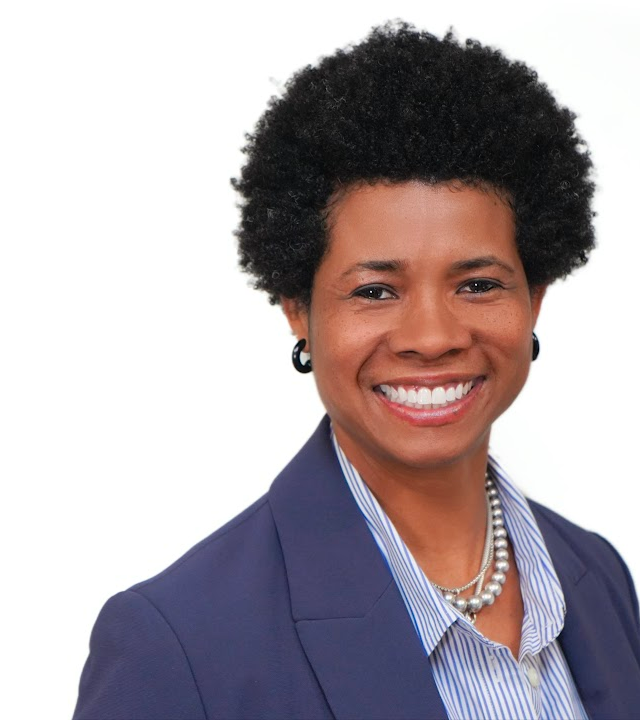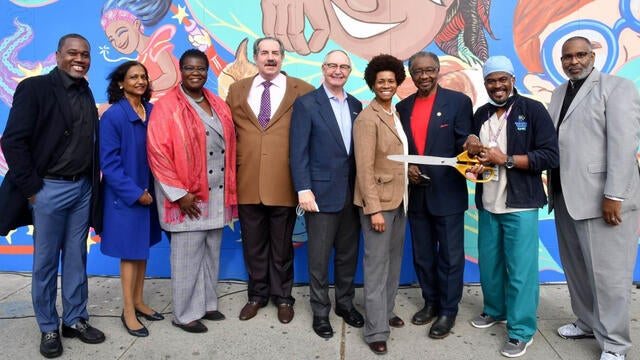
"To Bring Change, Be At the Table Where Decisions are Made."
In a conversation with our team, Dr. Sandra Scott, the first woman and first African American to hold the position of Executive Director at One Brookdale Health's Brookdale Hospital Campus, discussed how her parents’ high expectations for education and cultural open-mindedness helped her succeed and how 2020 changed her career path.
Why it matters: One Brooklyn Health/Brookdale Hospital has been a partner of Make-A-Wish for many years, treating and referring wish kids. We all believe that a wish works in tandem with medical treatment to help a child fight their illness.
Q: How does it feel to hold the position of Executive Director at One Brookdale Health's Brookdale Hospital Campus?
A: It feels great - mostly because of how other people feel about it! When I walk through the halls of the hospital or I’m in the community, people tell me how excited they are to see me in this position. Patients and employees feel I’m accessible, they identify with me. They’ll say OMG, you look like my sister or my cousin! And they’re proud - quite honestly people tell me they are proud to see me in this position – and that feels really, really good.
Q: You’ve said that 2020 was a horrific year working in Emergency Medicine. How did that experience drive you towards hospital leadership?
A: That year hit me hard. Towards the end of 2020 I really understood how if you’re in leadership in medicine – particularly physician leaders but leadership in general - you have the opportunity to have a real impact on the community.
I’m saying I, but I’m speaking as a leader driving change – driving cultural transformation and therefore improving the quality of life, not just for the community the hospital serves, but also for the workers, their life and their health.

Q: How did you decide to go from practicing Emergency Medicine – which you love – to a role in hospital leadership?
A: I had a conversation with one of my mentors from about 15 years ago – coincidentally, one of his friends was a COVID patient in the hospital. I told him I felt a change was coming for me, but I had concerns. What he told me was that ‘We - Black and brown people - need to be at the table when discussions are had, when decisions are made, when policies are made, when funding is allocated, to bring about the change that we want to see in America.” It really makes a difference when you have women at the table, when you have cultural diversity at the table – it changes the dynamic of the conversations. That’s what prompted me to take on the additional leadership.
Q: Where did you grow up?
A: I was born in New Orleans. Both of my parents are educators and that normalized the rigors of education for me and my sister very early on. My mom taught fashion design and merchandising, and my dad got a Ph.D. in the 70’s – a time when I believe there were very few African American men with a Ph.D. in engineering. I went to my dad’s classes – like you see in the movies where the professor is writing numbers filling the entire chalkboard, that was my dad - and I was a little girl sitting in there with the college students.
Q: Your education and career have taken you to various cities in the US. What has that journey taught you?
A: I was a biochemistry major at LSU – I think I might have been the only person of color in my biochemistry and microbiology classes – and certainly in the premed honor society. So, it was isolating in the beginning. I didn’t get much support from the guidance or career counselors. They were just kind of like ‘Well, we wish you the best of luck.’ However, I worked in the chancellor’s office where they saw I was taking difficult classes and then coming in and answering phones and filing – and doing well. In that environment – more so than in the rest of the system - my desire to be a physician was normalized.
I didn’t know it at the time, but there was a big push to increase the number of Black and brown – mostly Black - people in medical school in the US. I was offered a spot at LSU medical school quickly, but I had a friend say ‘Nope, you should do at least one other interview.’ I ended up going to Baylor in Houston – essentially the Ivy League medical school of the South. It was still a little difficult – I was a little, tiny Black girl from Louisiana at Baylor, and I had to learn how to negotiate in that environment. You’re very vulnerable as a medical student; you need to get certain grades but also the professors have to like you. I had to negotiate some situations where I thought I wasn’t graded fairly.
I went to Boston for my ER residency and found out quickly that the North and Boston aren’t necessarily less segregated than the South. It was a great educational experience though because Boston is a city full of academics and phenomenal institutions. I always went to NYC for fun, so I thought that I would go live there for a couple of years and then go experience the West Coast but I’ve never left NYC. I just love it!
Q: You described your challenges in medical school as being perhaps easier than for other Black and brown people. What prepared you differently?
A: I think what helped me a lot was that my parents were open-minded. From middle school and all through college my friends were white, Chinese, Indian, Jewish, really culturally mixed. I learned different cultures early on so that when I was in a predominantly white environment it wasn’t as jarring for me. I understood they are people too. One time in high school I went on vacation with my white friend’s family. I used to wear a lot of gold chains – and the youngest daughter in the family was like ‘Oh, you look just like Mr. T.’ I thought it was kind of a racist comment, but I loved the family and I knew they loved me. I could process that in a way that didn’t feel so negative - but I could also go back to them and say, ‘C’mon guys, that’s not nice.’
I think being culturally open-minded and comfortable helped me to be successful and I think that plays out today as well.
Dr. Sandra Scott is the first woman and first African American to hold the position of Executive Director at One Brookdale Health. Dr. Scott, a recognized physician leader and educator is a graduate of Louisiana State University in Baton Rouge, Louisiana, and Baylor College of Medicine in Houston, Texas. She completed her Emergency Medicine residency at Boston Medical Center. Dr. Scott served as the Chief of Service for Emergency Medicine at Rutgers New Jersey Medical School and Chair of Emergency Medicine at Lincoln Medical Center in the South Bronx.